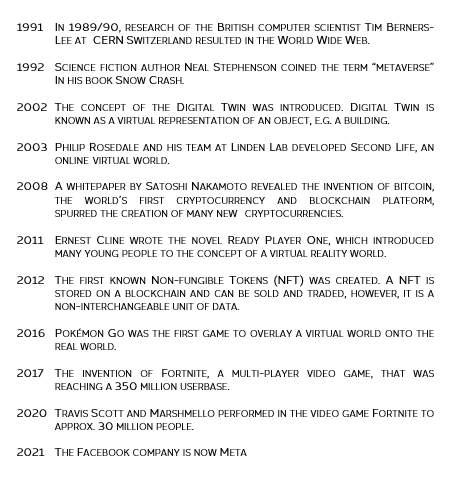What does metaverse mean?
Metaverse is a combination of both, the Greek word “meta” and the English word “universe”. Meta in Greek is popularly used as a prefix to mean “after” or “beyond”. The metaverse is the convergence of two ideas that have been around for many years: virtual reality and a digital second life. The metaverse represents the fourth wave to computers, following the mainframe computing, personal computing, and mobile computing. The inter-connectivity of such a computing landscape is among the most interesting aspects of this evolution. Currently, however, there remain some key friction points to solve. Among these issues are hardware, broadband connectivity and mass appeal use cases. However, most investors and tech operators are investing toward this direction.
the metaverse is here, and it’s not only transforming how we see the world but how we participate in it
Satya Nadella, Microsoft CEO
In October 2021, Mark Zuckerberg morphed Facebook into Meta, announcing its rebranding and repositioning towards the metaverse. He believes that the metaverse will replace the internet as we know it saying that “the next platform and medium will be even more immersive and embodied internet where you’re in the experience, not just looking at it, and we call this the metaverse”.
Areas of the metaverse
Over the past 20 years, some early adapters have been using the virtual world for entertainment purposes, research, and training. Some elements of the metaverse can be found in video games, where players spend time with a personal avatar1. The importance of the online virtual space, however, has surely grown due to the Corona Pandemic, accelerating the transition to Metaverse. With the lack of physical experiences during the pandemic, the AR and VR market saw strong growth. Consumer adoption will certainly be a major driving factor in business opportunities for AR and VR.

